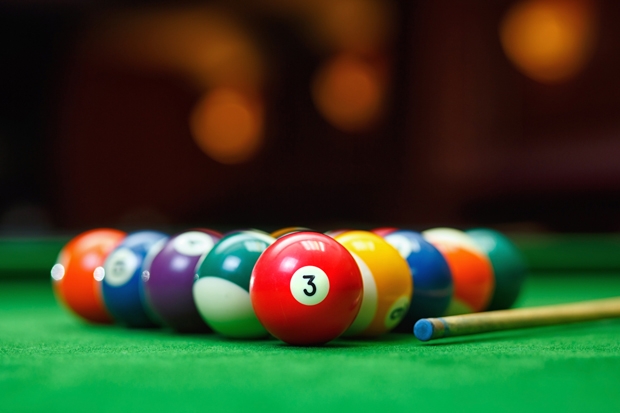Six months ago I bought a garden chair on eBay. When I went to the address to pick it up, the bloke drew thoughtfully on his fag and said did I want a child’s folding snooker table, balls, cues and a little brush for a tenner. At the time, my six-year-old grandson was watching a snooker championship on the television and keeping me up to date with the progress of Ronnie ‘the Rocket’ O’Sullivan, for whose lightning skill and slightly raffish persona he had developed an appreciation. ‘Absolutely,’ I said to the bloke, and we chucked the table in the back of the car as well.
The table measured four feet by two feet. The balls were half-size. When I leant over the table to cue, everything was in miniature. The geometry was the same, however. And the lightness of the balls and the shortness of the cue and the wobbliness of the table quickly became familiar. But I prefer pool to snooker. Pool is my game. I once worked as a care assistant in a halfway house for schizophrenics. Apart from tobacco and occasionally cider, all life and interest in the house revolved around a pool table in the carpeted sitting room. The fascination of cause and effect, of shifting geometry, and of the incredible vagaries in an individual’s luck, illustrated by a floodlit oblong of blue baize, sharpened these halfway people’s focus on reality better than anything else. For some, pool was their only form of communication or self-expression. I’d turn up for work, play pool for eight hours, then go home again. And I’d do the same the next day. In their sedated state, they were thoughtful and infinitely relaxed opponents. In time, playing against these largely silent, high-calibre players improved my game beyond all recognition. Pool became an obsession. As a carefree potter, however, I could always be beaten by an orange-fingered schizophrenic plotter.
I bought a set of pool balls and some chalk cubes online and set about teaching my grandson everything I had learned from my former mentors about the grand old game of eight-ball pool.
Oscar was an enthusiastic student. Every afternoon, when he came home from school, we’d set them up and chalk our cues. As an opponent he was the exact opposite of those sedated schizophrenics. He would jump up and down with excitement when it was my go, and smash the white ball without a moment’s measure or aim when it was his. Delivering chaos and commotion to the tranquillity of the balls on the table was the height of his ambition. Any effort by me to direct his aim or modify his cue action — which was fine for driving a gondolier or a herd of cows but not suitable for the intricacies of pool — fell on deaf ears. If I persisted with advice, it was treated with contempt. I soon became bored then irritated with picking the white ball out of the pocket almost every time he visited the table. For a while I was patient. And then my patience ran out and I became petulant. We argued. I downed tools and refused to play until he accepted that pool was an intricate game that should be played with skill, thought and delicacy, all of which had to be learned. To get me reluctantly back to the table he promised faithfully to listen to advice, then relapsed almost immediately into his philosophy of hit hard and hope.
After another week of this, my own game improved, and dramatically. Suddenly I was playing with the deft assurance I had acquired 20 years before when I played pool all day every day. It was as though I had learned a language, lost it, and it had suddenly come back. Once again anything and everything was possible. I was potting doubles and trebles off the cushion effortlessly. I was weighting my shots to perfection and dropping the balls in. I was clearing up from the break. Even on a four-by-two-foot table, I was achieving shots that Oscar found difficult to believe were by design — and so did I.
So impressed was he that he had a change of heart. Now he humbly consented to listen to advice on his stance and cue action and he conscientiously acted on it. Almost as crucially, he began to vary the force with which he hit the balls, no longer disdaining the gentle caress. The effect on his game was revolutionary; the improvement was as sudden and spectacular as my own had been. Now we’re really playing pool, he and I. We’re equally matched and have fantastic games. Any minute now he’s going to come through the door after school, like a conquering hero. I’ve got the balls racked up and cues chalked all ready. It’s his turn to break.







Comments